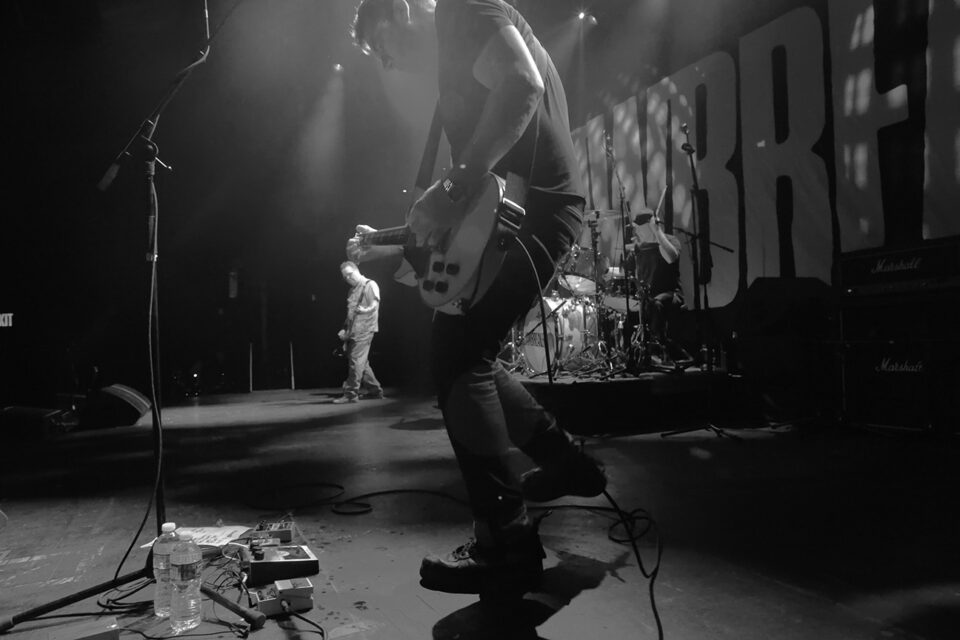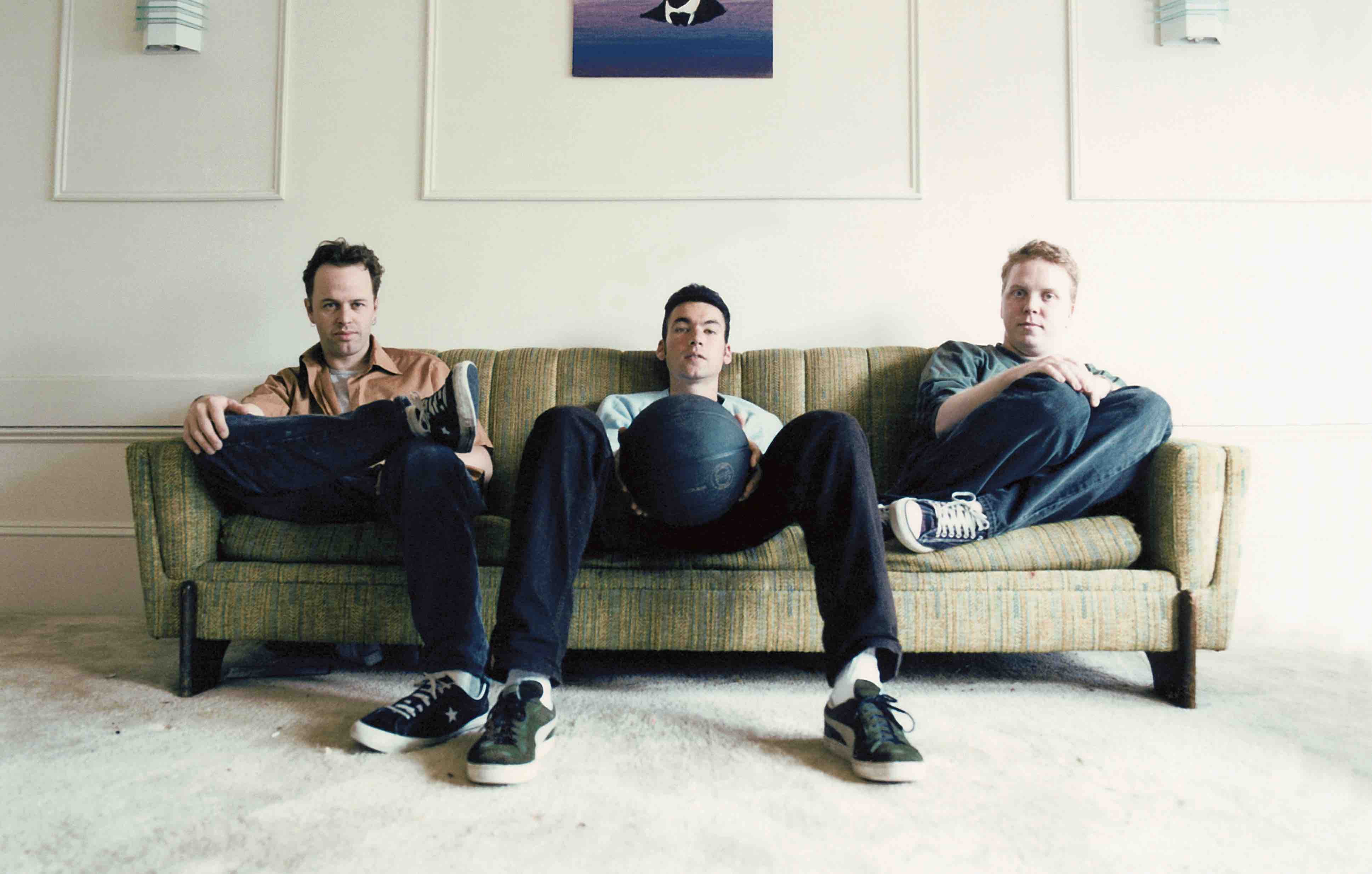In 2017, Jawbreaker shocked the punk world by announcing their reunion some 21 years after the trio—vocalist/guitarist Blake Schwarzenbach, bassist Chris Bauermeister, and drummer Adam Pfahler—imploded under rather acrimonious circumstances. Partly, that was because the punk community literally turned their backs on the band when they signed a major-label deal with Geffen and released their fourth album, Dear You. Unfairly reviled and dismissed at the time, it is—and always was—a formidable, phenomenal record. Shrouded in darkness and despair, Dear You crystallized the band’s musical intelligence and lyrical acuity to produce a set of songs that would go on to influence a wealth of bands years down the line.
At the time, however, the fallout from the record was the catalyst for the band’s demise. Now, the band is embarking on its first proper post-reunion tour, celebrating the (now belated) 25th anniversary of that last record by playing it in its entirety. From his apartment in Brooklyn, Schwarzenbach—who went on to form Jets to Brazil, Thorns of Life, and forgetters—reflects, with his trademark intelligence and humor, on bringing the legacy of that record to life a quarter of a century later, as well as the ghosts that have haunted him along the way.
Presumably you see the irony of this sold-out tour that’s celebrating an album that many people in the punk scene despised when it came out. Do you feel vindicated now?
I think any vindication that we felt happened at Riot Fest, the first time we played again. That was beautiful and it kind of cleared the air. The only thing we’re interested in is seeing people and being around music again, so it’s great to have that occasion of this record, which is a record about survival in a lot of ways, and kind of grinding across a hostile landscape. So I’m going to argue that that fits the national mood or whatever.
“The only thing we’re interested in is seeing people and being around music again, so it’s great to have that occasion of this record, which is a record about survival in a lot of ways, and kind of grinding across a hostile landscape.”
When you were playing those songs after the reunion in 2017, you were infusing them with a post-Jawbreaker aesthetic. Do you see these as living songs? Do they exist as much in the present as they do in the past?
I wish we could stretch them further without breaking them, but they have to stay representative for people who come to see them. Especially in this context of “the album.” You could present that experience in a number of ways—you could be Wilco and deconstruct that record, which could be great. We do have a couple shred parts that my band was kind enough to indulge me in. “Jet Black” has an extended outro, so I get to walk the dog a bit.
I remember when we spoke a couple years ago you said, “I just want to fucking shred!” So clearly music still has this primal impact on you all these years later. Does it feel weird to just retread the past, as opposed to being an actively creative force?
I think that’s a real fear. Something we’re determined to avoid is to be a “heritage act.” That fucking sucks. The language and the thing itself. And this is a problem in cultural media—the word kind of summons the thing that it’s both reporting on and indicting at the same moment. I don’t think any of us are interested in being a heritage act, much as we want to keep a roof over our heads and eat better food than we used to eat. Which is where all my money goes—just basically on food.
We are trying to write. The pandemic has been a bit of an intrusion into that, but we’ve been bringing ideas together. So definitely we see the band as living and striving to not just play the catalog. And that was our old model. Jawbreaker back in the day was always half an album ahead of where it was touring. So we’d usually play songs that nobody knew to people that were coming for the last album. And that was a good, if disappointing, relationship to have with our fans. I think, ultimately, people got charged off that, retrospectively.

What was your headspace like when you were writing Dear You? It’s such a dark, existentially bleak record.
In the last 30 years I’ve discovered that I’m authentically a bipolar personality, and I take medication to manage that. When I look back at those songs, half of them are about mania and depression, and the strange place that those two things meet in a short time. Especially the song “Million”—everything is kind of a brutal duality, and all the lyrics are constructed that way. And I didn’t really know at the time that I was writing those songs. I was more describing my feelings in my world very sensually, and I’m happy to look back now and recognize myself in crisis in those songs.
Also, I think they do speak to plenty of other people. They spoke to that moment of being worried and disengaged at the same time with this effervescent culture. There’s also the idea of being overvalued as a punk rock commodity in the marketplace of that time and having an impoverished emotional life simultaneously. So feeling over-adored and completely unimportant and insignificant, having suicidal ideation and being like, “I’m a worthless speck, why would anyone want to give me money if no one will even go on a date with me?” So that simultaneity of two states of being is still present. And that’s always going to speak to me, so I think I can sing with conviction when those lines come up.
“I don’t think any of us are interested in being a heritage act, much as we want to keep a roof over our heads and eat better food than we used to eat. Which is where all my money goes—just basically on food.”
Now that you’ve been diagnosed and you’re on this medication, do you recognize the person in those songs, or do you see him as more of a stranger who was having a really tough time?
Oh, I recognize him all too well.
So he hasn’t gone away?
No, he’s not going anywhere. This is it for the duration. And I like that person. I wish I could advise them to be a little more bold about their place in the world and not just internalize everything. This is also a very internal and lonely record. And even the making of it was fairly lonely. Along with Rob [Cavallo] the producer and Neill [King] the engineer, we were really this five-person island making it in secret and feeling tremendous pressure. The perfect historical story about that record is while we were recording in Berkeley, Rancid was two doors down tracking …And Out Come the Wolves. I walked down to their room and there were about 25 people playing back these really high-energy songs. They had their crew, they had friends, the label. Everyone was there—it was like this birthday party. And then you go back to our room and it was like an abandoned church or something. I knew at that moment that this was going to be a long ride. Or a very short ride. But it was very clear to me where we fell on the popularity spectrum.
Jawbreaker was most often you very much looking at the emotions, turmoil, and trauma inside you. Whereas as you got older and your other bands came along, that worldview kind of expanded. So how do you see those views now reflected in Jawbreaker?
I do feel, for my own sake, that I want to write about what is driving me insane, and as I’ve grown older that’s tended to be more and more outside of myself. Now I’m not driving me insane—fascists are driving me insane. And so how do you write about that in a way that’s poignant and not MSNBC? That’s the distinction. I don’t want someone to just tell me what I know in a song. It has to be very sharp in detail about how it makes you emotionally stunted as a human. And I think that’s something that forgetters did well, was write about that pummeled human.
My therapist said a great thing to me once. When I finished the forgetters record, I was at an all-time low and basically headed to an institution. I went into a session and I said, “I don’t feel love in my life, in this world.” And he shocked me because he was so perceptive. He said, “You just made a record, if that’s not an act of love, I don’t know what is. You made a living document that you’re sharing with your world, whether you love it or not.” I think he was right. And the fact that we keep doing these things has to argue against total despair.
“I want to write about what is driving me insane, and as I’ve grown older that’s tended to be more and more outside of myself. Now I’m not driving me insane—fascists are driving me insane. And so how do you write about that in a way that’s poignant and not MSNBC?”
Was that the catalyst for doing Jawbreaker again, finding your joy and your purpose in life?
I don’t think that was the thing that got me prepared, but it was the thing that I did have to go through to be well enough to say yes to re-entering this trust of the band. And I think each of us, actually, went through a pretty deep, life-altering experience—not necessarily involving institutions, but there were major life changes that happened to everybody and it was a very unique coincidence of events that had us all in a place where we kind of had not much else to do, but we were also very clear about who we were at that point, what we could do, and what we couldn’t do. And it was very tentative.
In the beginning we were protective of ourselves and of the band, so we just practiced to see if it felt like the band. It was a lot of vetting before Riot Fest, and it was good that the stakes were so high, because we really had to take it seriously, like we were going to be the ones who fell down in front of everybody. And I don’t like challenges like that necessarily—I think that’s very capitalist, and I’m not into that kind of aggro-competition, but in this case it was good. It was like having a really stern taskmaster of this date and this appearance to channel your anxiety into work. And it became a really therapeutic thing, I think for each of us, focusing on these songs, but also seeing how to repair our relationships and what they meant at this point.
Are you good friends again now?
Yeah. I mean, we drive each other crazy still, but I would kill for either of them. And for the band. FL









